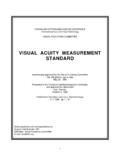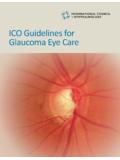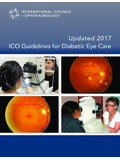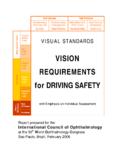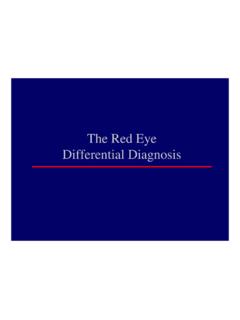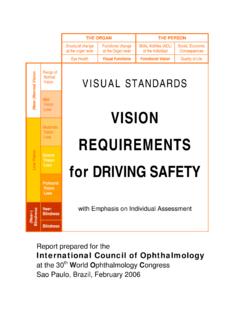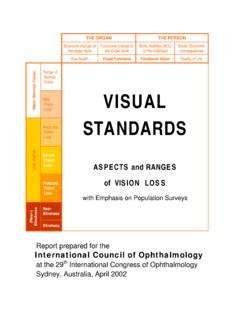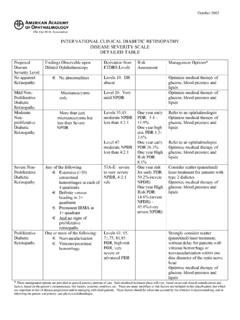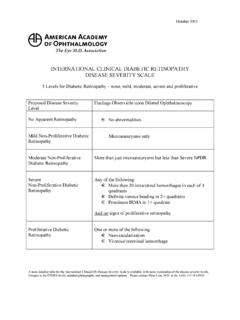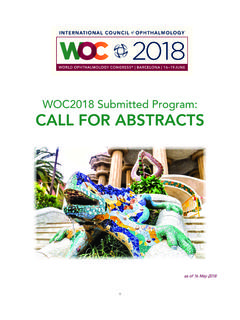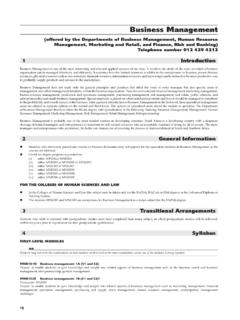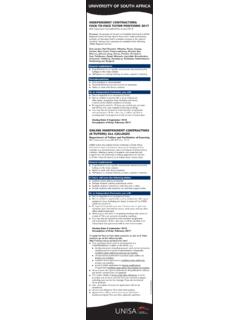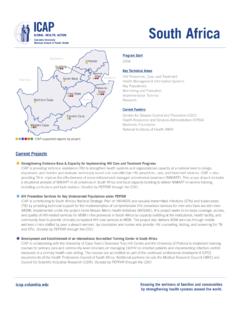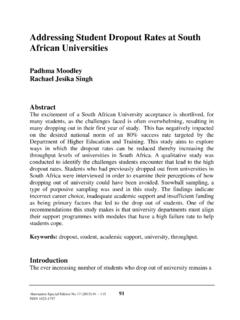Transcription of UNIVERSITY OF CAPE TOWN - International …
1 UNIVERSITY OF cape town UNIVERSITY OF cape town COMMUNITY EYE HEALTH INSTITUTE 2011 POST GRADUATE DIPLOMA IN COMMUNITY EYE HEALTH GENERAL INFORMATION WHAT IS VISION 2020? Vision 2020 is a global initiative for the elimination of avoidable blindness. It is a partnership initiative of the World Health Organisation (WHO) and the International Agency for the Prevention of Blindness (IAPB). The global programme was launched in 1999. WHAT IS COMMUNITY EYE HEALTH? Community eye health is the application of health promotion and disease prevention, together with the delivery of curative services, at the primary, secondary, and tertiary level of health care, in order to reduce eye disease, visual loss and disability in a community.
2 Community eye health extends the traditional clinical practice of ophthalmology applied to individual patients to a consideration of the eye health of whole populations, and how these can be assessed and provided for. This requires training in specific skills not usually included in conventional clinical ophthalmology training. The role of a community eye specialist will vary from country to country, but will include some or all of the following: Assessment of the eye care needs of the community. Design and planning of eye care programmes. Management and evaluation of these programmes. Development of human resources for eye care services. Advocacy for community eye health with politicians, health policy makers, and the medical profession.
3 Research into the main eye diseases, including aetiology and risk factors, clinical trials, and health service research. WHAT ARE THE AIMS OF THE COURSE? The aim of the course is to facilitate the implementation of Vision 2020 in countries in sub-Saharan africa by offering appropriate training in community eye health to people working in blindness prevention programmes. WHO IS THE COURSE FOR? The course is intended for people working in prevention of blindness programmes in sub-Saharan africa . These may include national Vision 2020 coordinators, district Vision 2020 programme managers, and clinical professionals working in Vision 2020 programmes (ophthalmologists, ophthalmic medical officers, ophthalmic clinical officers, optometrists, ophthalmic medical assistants, and ophthalmic nurses).
4 It is planned primarily for programme managers, with the intention that the participants would be able to plan and manage a district Vision 2020 programme. It does not aim to provide a clinical training in ophthalmology. The course is in English, and would therefore be most suitable for people from Anglophone African countries. WHERE IS THE COURSE HELD AND WHO IS RUNNING IT? The course is held at the UNIVERSITY of cape town Community Eye Health Institute at Groote Schuur Hospital, UNIVERSITY of cape town , south africa . It is run by the Division of Ophthalmology of the Faculty of Health Sciences of the UNIVERSITY of cape town . Professor Colin Cook, who is an ophthalmologist and is the head of the Division of Ophthalmology, is the course convenor.
5 The course is taught by an International faculty. WHAT ARE THE ENTRY REQUIREMENTS FOR THE COURSE? The course is a post-graduate diploma of the UNIVERSITY of cape town . The entry requirements are : An undergraduate degree in health sciences, social sciences, or business management, or an equivalent UNIVERSITY qualification, or recognition of prior learning A minimum of two years of work experience in the Fluency in English, as demonstrated by a matric or equivalent pass in English Basic computer literacy. It is recommended that students should also obtain a written undertaking from the relevant MOH or INGDO that adequate support will be provided for the implementation of the planned Vision 2020 programme.
6 Students who have previously successfully completed a community eye health certificate course at the UNIVERSITY of cape town may receive recognition of this, with credits for the relevant modules. WHAT ARE THE COSTS? Students come to cape town for 10 weeks at the beginning of the course and again for 2 weeks at the end of the course. There is a UNIVERSITY fee surcharge for non SADC students. A recommended budget for SADC students is Item Rand Amount Approximate US$ Amount (8:1 10:1) Programme fee Travel to cape town x 2 800-1000 cape town living expenses (R275-R325 per day x 12 weeks) Course materials 200-250 Total A recommended budget for non SADC students is Item Rand Amount Approximate US$ Amount (8:1 10:1) Programme fee Travel to cape town x 2 cape town living expenses (R250-R300 per day x 12 weeks) Course materials 200-250 Total A limited number of scholarships may be available; therefore students should be ideally funded by MOHs or NGOs.
7 WHAT IS THE APPLICATION PROCESS? Persons interested in applying for admission to the course in 2011 should contact the course administrator, Aayesha Patel Application forms for admission to the course in 2011 will be sent. These should be completed and returned to the course administrator. The closing date for applications is 31 October 2010. Applicants who are accepted for the course will receive a letter of acceptance. Non south African applicants should apply for a visitor s visa for the duration of their stay in cape town . Non south African students should submit 1. Copy of passport. 2. Copy of visa. 3. Proof of payment of course fee or of scholarship. WHAT ARE THE DATES FOR THE COURSE IN 2011? Initial period in cape town (10 weeks) 31 January to 8 April Intermediate period working back in the student s health district (30 weeks) 11 April to 4 November Final period in cape town (2 weeks) 7 November to 18 November.
8 CURRICULUM TITLES + DURATION OF MODULES Module Module Components Duration (weeks) 1 Introduction to Vision 2020 Cataract Childhood blindness, refractive error, low vision Other blinding eye diseases 4 2 Health promotion for Vision 2020 Human resource development and health education for Vision 2020 2 3 Management 1 - Advocacy and strategic leadership Management 2 Project management Management 3 Programme development and implementation Management 4 Programme administration and management 4 4 Programme implementation 6 5 Programme administration and management 1 8 6 Programme administration and management 2 8 7 Programme monitoring 8 8 Report back and debriefing on programme implementation 2 Total 42 SUMMARY OF MODULE OUTCOMES Module Module Component Outcomes 1 Introduction to Vision 2020 Demonstrate understanding and knowledge of the magnitude, causes.
9 And alternative control strategies for the major blinding eye diseases in the world and in africa Demonstrate understanding and knowledge of the components of the WHO / IAPB Vision 2020 initiative Demonstrate understanding and knowledge of the principles of programme planning Conduct a situational analysis of the needs and resources for a programme Cataract Demonstrate understanding and knowledge of the risk factors and pathophysiology of cataract Demonstrate understanding and knowledge of the different models of cataract surgical service delivery Demonstrate understanding and knowledge of the principles of the control of cataract blindness Design a programme outline for the control of cataract blindness Childhood blindness, refractive error, low vision Demonstrate understanding and knowledge of the risk factors and pathophysiology of the major blinding diseases of childhood and of refractive error, and the causes of low vision Demonstrate understanding and knowledge of the principles of the control of childhood blindness and visual impairment due to refractive error and low vision Design a programme outline for the control of childhood blindness, refractive error, and low vision Other blinding eye diseases Demonstrate understanding and knowledge of the risk factors and pathophysiology of each of trachoma, glaucoma, and diabetes Demonstrate understanding and knowledge of the principles of the control of blindness due to trachoma, glaucoma.
10 And diabetes Design a programme outline for the control of blindness and visual loss due to each of trachoma, glaucoma, and diabetes 2 Health promotion for Vision 2020 Demonstrate understanding and knowledge of the theories of health promotion Design the strategies for health promotion for a Vision 2020 programme Human resource development and health education for Vision 2020 Demonstrate understanding and knowledge of the human resource needs for Vision 2020 programmes Demonstrate understanding and knowledge of the theories of teaching and learning Design the programme strategies for the training, recruitment, deployment, and retention of the personnel needed for a programme Design a curriculum for the training of a cadre of primary eye care workers 3 Management 1 advocacy and strategic leadership Demonstrate understanding and knowledge of the principles of advocacy Demonstrate understanding and knowledge of the principles of strategic leadership Be able to apply these in managing a district Vision 2020 programme Management 2 project management Demonstrate understanding and knowledge of the principles of project management Be able to apply these in managing a district Vision 2020 programme Management 3 programme development and implementation Demonstrate understanding and knowledge of the principles of programme development and implementation Be able to
